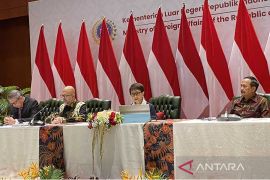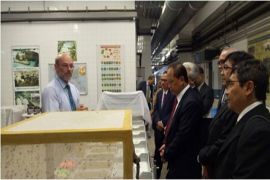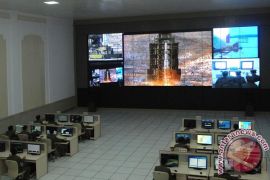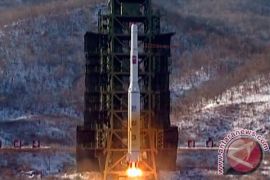Studies are now in progress to build two nuclear power plants in Babel with a combined capacity of 10,600 Megawatts. Nuclear power plants are expected to supply and meet 40 percent of the need for electricity in Sumatra, Java and Bali.
"The nuclear power plants are expected to become operational by 2025 or 2030 and hopefully they will meet 40 percent of the electricity need in Sumatra, Java and Bali," Governor of Bangka Belitung province Ekon Maulana Ali.
According to plan, the government will build two units of nuclear power plants with a combined capacity of 10,600 MW. One will be built in West Bangka district with a capacity of 10,000 MW and another one in Permis, South Bangka, with a capacity of 600 MW.
"The central government hopes that by 2013-2015 the preparatory and planning stages would have been completed. If the site test results show that it is feasible and appropriate for a nuclear power plnat construction then the government would continue the project," he said.
However, the governor was sure that the project would go on. "The plan to build nuclear plants in South and West Bangka to generate electricity would be implemented," he said.
He said the nuclear power plant construction plan was a central government policy which had been included in its master plan designed to accelerate and expand development.
He said that the government intended to develop a nuclear power plant as another electricity source to meet its national need for power supplies amid depleting oil and gas reserves. Fuel reserves from fossil such as coal, oil and gas were now depleting because they were not only used at home but also exported in large volumes.
"Hydro power sources are also declining because of whether anomalies and environmental damage," he said.
Therefore, alternative energy, nuclear in particular needs to be develop to meet the high need for electricity, yet he admitted that the construction of a nuke plant would take a long time as the government was now still in the process of surveying it and carrying out site test in Babel.
He said that for the construction of one unit with a capacity of one gigawatt, a fund of Rp35 trillion was needed. Babel was planning to construct two units which would be located in Muntok (West Bangka) and Permis (South Banka).
"With the need for about Rp70 trillion, the government should not be worried because there were many foreign investors who were interested in their construction," the governor said.
The government has earlier planned to develop a nuclear power plant in the Muria Peninsula, Jepara district, Central Java, to increase power supply in the country.
However, strong opposition from local people, non-governmental organizations and environmentalists have caused the government to delay the project and put it as a last resort in its efforts to build power generators and to increase the country`s power capacity.
The opposition was raised as local people were of the view that a nuclear plant would pose more danger than merits
The International Atomic Energy Agency (IAEA) data show that nuclear waste radiation, if leaked, would last for 24 thousand years. Therefore, Sunaryo, a nuclear turbine expert who graduated from a University in Russia, once said that nuclear wastes needed a special handling for about 24 thousand years to prevent them from creating environment problems.
After all, the atomic plant in Japan gave a lesson when it was recently knocked out by an earthquake-triggered tsunami and had a series of explosions which caused a radiation leakage into the air.
"Indonesia needs to learn from the Fukushima nuclear power plant incident and find the safest site for its future nuclear power plant," Prof Dr Herliyani Suharto, head of the International Network Program of the Indonesia Renewable Energy Community (METI) said recently.
She said the incident must become a challenge for Indonesia to find the safest place for the construction of a nuclear plant.
Head of National Nuclear Power Agency (Batan) Hudi Hastowo said Babel was the most suitable for the construction of a nuclear plant in Indonesia. The Batan chairman said that his agency would continue to apply various results of its nuclear scientific research in the locations that have been agreed by the Babel regional government.
Hudi said that Bangka Belitung was the most suitable place for the development of a nuclear power plant. It is conducive for the construction of a nuclear plant seeing from the aspect of its geological structure reinforced with hard granite rocks and strong electricity absorption capacity that could transmit power to Sumatra and Java.
Besides it is free from earthquake prone areas, Bable is also from a tsunami threat owing to the fact that the depth of its sea area is only about 30 meter, he said.
Apart from that, opposition to the development of a nuclear plant in Babel is not as strong as that in the Muria peninsula.
A survey conducted by Batan revealed that 35 percent of respondents in Babel supported a nuclear power plant . "The survey also showed that 30 percent of the respondents rejected the plan while 30 percent others have yet to make their choices," Hudi Hastowo said.
He said that the minor scale survey was conducted in the May-June 2011 period involving 500 respondents from various segments of the people in West Bangka and South Bangka. "Support will increase if the government continues to popularize it," he added.
(T.A014/A/HAJM)
Reporter: by Andi Abdussalam
Editor: Priyambodo RH
Copyright © ANTARA 2011










